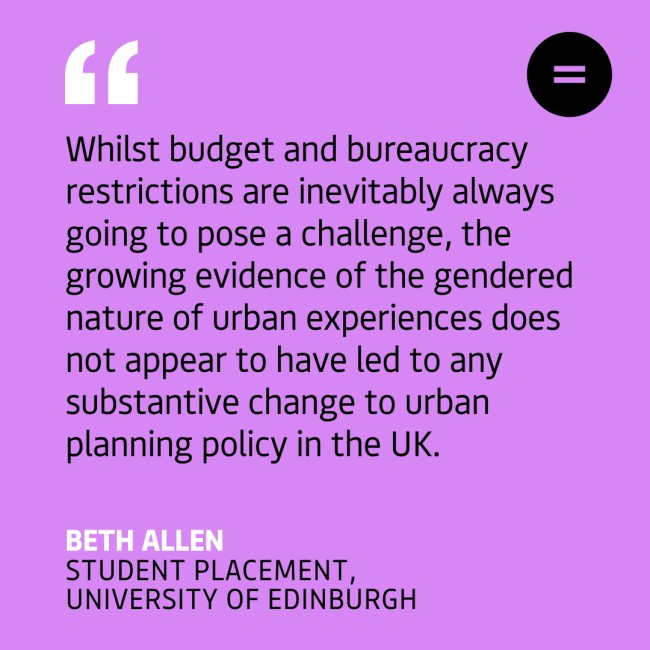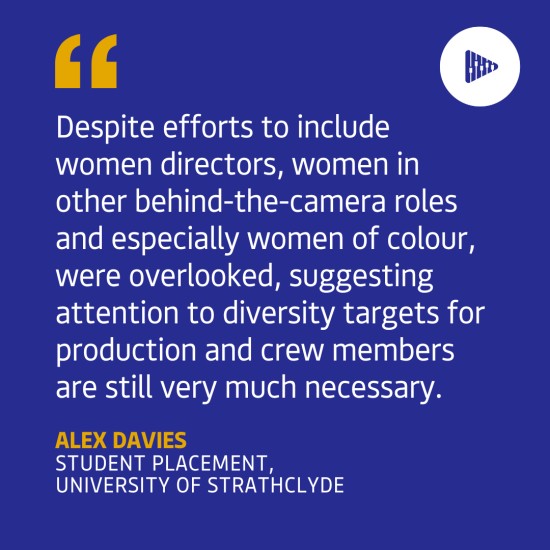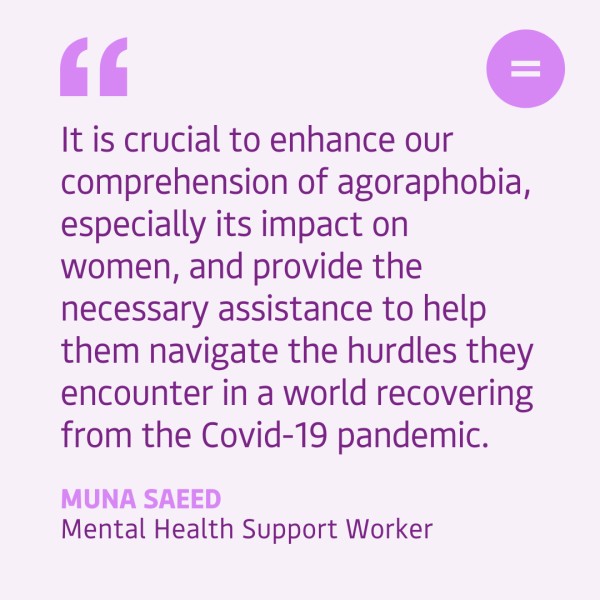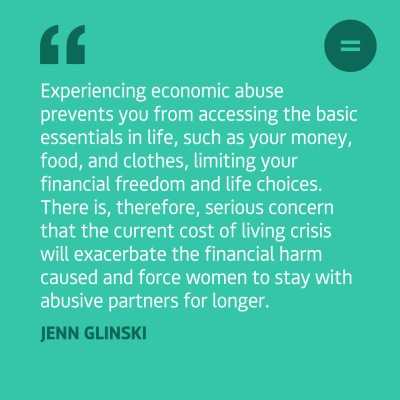Engender blog
GUEST POST: Feminist urbanism: Creating gender-equal cities in Scotland
Engender and the Equal Media and Culture Centre for Scotland have hosted student placements from the MSc in Social Research at the University of Edinburgh and the University of Strathclyde Applied Gender Studies and Research Methods course. As part of their research outputs, the students have produced a series of blogs.
In this post, Beth looks at how women and men experience public space and urban environments and how we can create gender-equal cities in Scotland.

When considering issues of gender inequality, one aspect that is perhaps far subtler and more discrete than others is the way in which the built environment is experienced differently by men and women.
In recent decades, feminist research has studied this phenomenon, with the evidence undeniably pointing to women being disadvantaged in their use of urban spaces. From a lack of accessible and functional public toilets, which biologically women require greater use of, to transport systems that are not built for a purpose beyond that of a daily office commuter, a range of factors have been demonstrated to restrict women’s access to the cities.
GUEST POST: Do we need diversity quotas in film?
Engender and the Equal Media and Culture Centre for Scotland have hosted student placements from the MSc in Social Research at the University of Edinburgh and the University of Strathclyde Applied Gender Studies and Research Methods course. As part of their research outputs, the students have produced a series of blogs.
In this post, Alex looks at why there's still work to do to ensure diversity behind the camera in Scotland's film industry.

The Glasgow Film Festival (GFF) is the UK’s third-largest film festival and one of Scotland’s biggest annual cultural events.
The UK Government has recognised its “significant contribution” to Scottish culture and to the careers of new filmmakers through its Audience Award. The festival’s organisers pick the nominees, but the winner is democratically elected by film-goers. Since the nominees are specifically chosen to nurture the careers of first or second-time directors, the award is a great site to foster a more diverse film industry in Scotland.
In recent years, criticism of the Oscars and BAFTA nominations drew attention to the underrepresentation of women and people of colour in the film sector. Research has demonstrated stark gender and racial disparities behind the scenes of the UK’s film industry. The Calling the Shots project studied British films produced between 2003 and 2015, finding that only 13% of their directors, 20% of their screenwriters and 27% of their producers were women. Statistics for women of colour were even worse, as 90% of the films examined did not employ any women of colour at all.
The Glasgow Film Festival’s director, Allison Gardner, has overseen GFF to go from strength to strength in terms of inclusivity, especially in its recognition of women filmmakers. In 2020, films directed by women opened and closed the festival for the first time and in 2022, 40% of all the films at GFF 2022 were directed by women.
Cinema for All?
Gardner has publicly voiced support for greater inclusivity in film, and has acknowledged that “We need to change those structures,”. Yet she has also asserted that the festival’s inclusive programming is not the result of quotas or targets but of a desire to maintain the “broadest possible appeal” to audiences. In fact, the Audience Award has consistently featured as many (if not more) women directors as men in almost every year of its history (see below), even before developments like 2017’s “Me Too” movement drew attention to gender inequality in the industry.
GUEST BLOG: Agoraphobia and Gender Post Covid-19
Women’s social, economic, cultural and political inequality with men undermines good mental health and wellbeing in a wide range of ways, including the impacts of gender stereotyping, medical misogyny and racism, and of course the disproportionate impact that austerity, Covid-19 and the cost of living crises have on women's mental health.
In this long read, guest author Muna Saeed explores the impact of gender on agoraphobia, and how this affects women in the aftermath of the Covid-19 pandemic.

Imagine a world where the thought of leaving your home fills you with dread and anxiety.
As the world outside continues to spin, you're trapped inside, desperately seeking comfort from the chaos that lies beyond your front door. This is the reality for those diagnosed with agoraphobia, a condition that goes beyond a simple fear of public spaces. It's a suffocating fear of being in situations where escape is difficult, and the fear of panic attacks threatens to consume your every waking moment. But what happens when we introduce gender into this equation? As a mental health worker who works closely with individuals grappling with mental health challenges, including agoraphobia, my aim is to shed light on the intricate and gendered complexities of this condition in a post-Covid-19 world.
GUEST BLOG: Giving birth during the pandemic

We've been working with the ALLIANCE and The Health and Social Care Academy to gather information about experiences of pregnancy and maternity services during Covid-19 from women across Scotland. Alongside our work, we're sharing a series of guest blogs reflecting on those experiences. Here, Barbara Flynn shares her experience of giving birth in the summer of 2020.
In March 2020, when lockdown was imposed, I was six months pregnant with my second child. Overnight, my thoughts went from, ‘I think I’ll book a pregnancy massage’ to, ‘will our lives ever return to normal?!’. I also went from eagerly anticipating my midwife appointments to agonising about having to go into hospital to give birth – the last place, it seemed, that anyone wanted to be now! As our street is near one of the main thoroughfares to the Queen Elizabeth University Hospital, ambulances speeding past became a familiar background noise, each one a grim reminder of my own impending trip to hospital.
GUEST BLOG: Economic Abuse and the cost of living crisis

As part of our guest blog series on the cost of living crisis, researcher Jenn Glinski explores how the current rise in costs is impacting victim-survivors of economic abuse.
Content warning: This blog discusses different forms of domestic abuse and their impact.
The current cost of living crisis and the difficult decision to ‘heat or eat’ is one that victim-survivors of economic abuse are all too familiar with. However, unlike the government-imposed crisis that the rest of the country has been subjected to, the daily cost of living crisis victim-survivors experience is deliberately forced upon them by their abusive (ex)partners. Experiencing economic abuse prevents you from accessing the basic essentials in life, such as your money, food, and clothes, limiting your financial freedom and life choices. There is, therefore, serious concern that the current cost of living crisis will exacerbate the financial harm caused and force women to stay with abusive partners for longer.
Downloads
 Engender Briefing: Pension Credit Entitlement Changes
From 15 May 2019, new changes will be introduced which will require couples where one partner has reached state pension age and one has not (‘mixed age couples’) to claim universal credit (UC) instead of Pension Credit.
Engender Briefing: Pension Credit Entitlement Changes
From 15 May 2019, new changes will be introduced which will require couples where one partner has reached state pension age and one has not (‘mixed age couples’) to claim universal credit (UC) instead of Pension Credit.
 Engender Parliamentary Briefing: Condemnation of Misogyny, Racism, Harassment and Sexism
Engender welcomes this Scottish Parliament Debate on Condemnation of Misogyny, Racism, Harassment and Sexism and the opportunity to raise awareness of the ways in which women in Scotland’s inequality contributes to gender-based violence.
Engender Parliamentary Briefing: Condemnation of Misogyny, Racism, Harassment and Sexism
Engender welcomes this Scottish Parliament Debate on Condemnation of Misogyny, Racism, Harassment and Sexism and the opportunity to raise awareness of the ways in which women in Scotland’s inequality contributes to gender-based violence.
 Gender Matters in Social Security: Individual Payments of Universal Credit
A paper calling on the Scottish Government to automatically split payments of Universal Credit between couples, once this power is devolved to the Scottish Parliament.
Gender Matters in Social Security: Individual Payments of Universal Credit
A paper calling on the Scottish Government to automatically split payments of Universal Credit between couples, once this power is devolved to the Scottish Parliament.
 Gender Matters Manifesto: Twenty for 2016
This manifesto sets out measures that, with political will, can be taken over the next parliamentary term in pursuit of these goals.
Gender Matters Manifesto: Twenty for 2016
This manifesto sets out measures that, with political will, can be taken over the next parliamentary term in pursuit of these goals.
 Scottish NGO Briefing for UN Special Rapporteur on Violence Against Women
Joint briefing paper for the UN Rapporteur on Violence Against Women.
Scottish NGO Briefing for UN Special Rapporteur on Violence Against Women
Joint briefing paper for the UN Rapporteur on Violence Against Women.

Newsletter
Sign up to receive our newsletter here:
Sign up to our mailing list
Receive key feminist updates direct to your inbox: